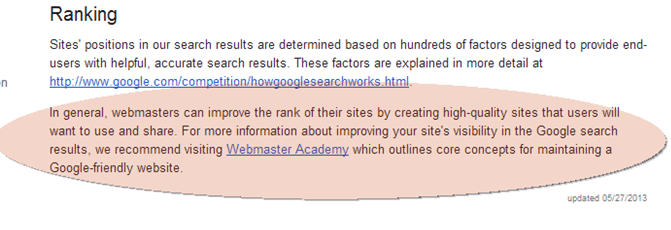On Wednesday Barry Schwartz reported that Google had changed the wording of Google’s ranking Advice Article. The article had previously read
“In general, webmasters can improve the rank of their sites by increasing the number of high-quality sites that link to their pages.”
The latest version of this now reads;
So Google is now saying we need to build quality sites not links!
What does this mean?
This has caused a little bit of a stir, with some SEOs questioning the life expectancy of SEO. Are we going to see new huge, dramatic changes to the algorithm? Does this now mean that Google has won in its battle to confine SEOs to the dole queue? Here are my thoughts…
I honestly don’t think this is something we should be too worried about. The old wording was clearly outdated I think this just a sign of modernising this statement rather than a sign of things to come.
Our own Head of SEO, Wayne Barker even suggested “It may be for legal reasons to cover its back with all the manual penalties it is giving out, as it may be perceived as contradictory in its previous format”
If we think about what Google is saying here:
In general, webmasters can improve the rank of their sites by creating high-quality sites that users will want to use and share
To me this just suggests working on content marketing and usability. If we follow these guidelines and create great sites with great content people are naturally going to share it and this in turn will generate links. Whilst we know Google is bringing other factors into the algorithm, I think they are still miles off having an alternative to links.
There is no doubt that the Landscape of SEO is changing, however one thing people fail to grasp is that although the phrase “Content Marketing” is relatively new, the concept isn’t. This is stuff that has been around for years and we should be doing anyway.
What the future holds
OK so what does all of this mean to the future of search? Other than content marketing is there anything else we can be doing?
Guest Blogging
I think guest blogging purely for link building may be on borrowed time. As with anything I think it’s a balancing act as to what is an acceptable level. If you are engaging in guest blogging for genuine reasons other than link building and are blogging as yourself and using authorship that should not be perceived as trying to manipulate the search engines.
Authorship
Authorship is high on Google’s agenda and if you are not already using authorship you should be. Whereas previously the majority of the weight came from where the link was coming from, it is fair to assume that WHO the link is from will also carry weight. Tom Anthony over at distilled wrote a great post about this. It’s quite an old one but still a great resource.
Social Media
Reading between the lines, this is the strongest signal so far from Google that Social Media will be part of the Algorithm over the coming months/years. There is quite a lot of debate as to whether social media actually has any clout. My thoughts are that it is currently more of a verification signal; however it is only a matter of time before it becomes more relevant. I think the use of the word “share” was an interesting one referring to G+’s “share button.
Local search
Local search is going to play a big part in search moving forward. If you are a local business and particularly a service-based one, you need to be all over social media. Social signals are the best endorsement you can have in local search . What better verification for the search engines. If I am looking for a plumber and Google knows (because of social sharing) that one or a number of my friends have endorsed a particular plumber? Then it makes sense that that particular plumber is the right one for me and will therefore get prominence.
Usability
The majority of us have Google Analytics plugged into our website, 10 million according to matt McGee. This means Google knows a hell of a lot about your site, your users and their behaviour on your site. It can therefore get a pretty good idea as whether you are giving the user a good experience or not. If your site offers a poor UX expect poor SERPs in the future.






